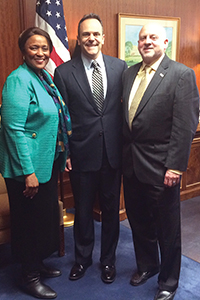By JULIE MINDA
Changing political winds last year led to moves in several states to expand eligibility for Medicaid. Catholic health care providers who have been advocating for such changes for years are celebrating the expansions and predicting improved health care access and outcomes in those states.
Among the states that saw significant changes in Medicaid eligibility parameters late last year or at the start of this year were:
- Alaska – Its expansion went into effect Sept. 1 and coverage became effective that date; an estimated 42,000 Alaskans are newly eligible for Medicaid.
- Louisiana – Its expansion was approved last month; about 275,000 Louisianans are newly eligible, with coverage to become effective this summer.
- Montana – An October approval of an expansion waiver made about 70,000 Montanans newly eligible for Medicaid. The effective date for coverage was Jan. 1.

"We are very excited that Medicaid expansion has passed," said Mike Foster, regional director of advocacy for SCL Health, and an advocate for Providence Health & Services in Montana. "We've been working hard to push for this outcome … and it was in line with our efforts to help the poor and vulnerable, to help find coverage for low-income Montanans."
Catholic health care providers nationwide helped secure passage of the Affordable Care Act in 2010. ACA architects designed the law to work in conjunction with joint state and federal expansion of Medicaid eligibility requirements. But a seminal 2012 Supreme Court decision left it up to states whether to expand Medicaid under the ACA. Since then, ministry advocates have worked to secure state support for expansion. As of mid-January, 31 states and the District of Columbia had expanded Medicaid eligibility; 16 states had not; and three states had not yet decided, according to the Henry J. Kaiser Family Foundation.
CHRISTUS Health championed Medicaid expansion in the states it serves, including Louisiana and Texas. Its advocacy work involved educating legislators and the public. As part of these efforts, during debate on Medicaid expansion in Louisiana, CHRISTUS countered public concerns about the cost of expansion, to the state. Under the ACA, the federal government will pay 100 percent of costs for expanded Medicaid through this year. Beginning next year, states will begin to pay a portion that will increase to no more than 10 percent of costs on a permanent basis, according to the Center on Budget and Policy Priorities. CHRISTUS pointed toward analysis showing that those costs would be more than offset by jobs saved and by premium taxes paid to the state for each new enrollee. Louisiana's managed care organization for Medicaid pays the fee.
Public opinion shift
"People started to realize and understand it's their money," going to other states, while they received no benefit, said Gabriela Saenz, vice president of advocacy and public policy for CHRISTUS Health.
In November, Louisiana elected Democrat John Bel Edwards governor. On his second day in office in January, Edwards signed an executive order to expand Medicaid eligibility, reversing the position of his predecessor Bobby Jindal, a Republican who opposed expansion.
Saenz expects under expanded eligibility many former uninsured patients, who previously could not afford to pay for their health care, now will be eligible for Medicaid. She said uninsured people who came to emergency departments for nonemergency care now may seek care in more appropriate venues. She expects a slow increase in the newly insured seeking more medical care. She also anticipates a decrease in hospitals' charity care spend as more patients' care is reimbursed by Medicaid.
CHRISTUS advocates now are focused on ensuring that already-low Medicaid reimbursement rates do not worsen in Louisiana, said Saenz.
According to Poverty USA, an initiative of the Catholic Campaign for Human Development, Louisiana is the 49th most impoverished U.S. state, and Texas ranks 39th. Now that CHRISTUS has helped bring about the Medicaid expansion for the low-income population of Louisiana, Saenz said, the system is "continuing to pursue options so that the approximately 1 million Texans that are in the coverage gap get the access to care that they deserve."

Bipartisan agreement
In Montana, said Foster, the expansion happened because Democrats and Republicans united behind a bill sponsored last session by Republican State Sen. Ed Buttrey. SCL Health and Providence participated in the efforts of a small group selected and led by Buttrey, to develop and build support for the legislation. In October, the Centers for Medicare and Medicaid Services approved the Montana waiver connected with the legislation. According to a Kaiser Family Foundation resource, the waiver in part allows for the collection of monthly premiums and co-payments, at a capped amount, for the newly insured.
Foster said during expansion debates in the state, citizens related compelling stories of medical hardship at legislative committee hearings.
"It was terribly sad. Here were people trying to care for their families, and with one big health problem, they'd lose their job, or have to take a lower-paying job that they could do with their condition. With Medicaid, they could get that transplant or surgery. These were very serious health matters gravely affecting people and their families," said Foster.
Jeff Fee is regional chief executive of Providence Health & Services in Western Montana, and last year he chaired the Montana Hospital Association. He said the bill succeeded in part because proponents made it palatable for citizens who were concerned that the expansion could benefit people unwilling to work. "We said, you can't be productive if you have legitimate health issues."
Foster added, "The philosophy of the bill sponsors was, they wanted people to improve themselves … and have better opportunities to get and keep higher-paying jobs. By paying co-pays and premiums, they'd learn what it's like to have private insurance — for when they got that better job."
Uncertain impact
Alaska, another state Providence serves, also passed Medicaid expansion — Gov. Bill Walker, an independent, approved the expansion, over the objections of many in the legislature.
Bruce Lamoureux, senior vice president and chief executive of Providence Health & Services' Alaska Region, said Providence advocacy efforts helped to influence that outcome. He expects that Medicaid expansion will lead to a slow ramping up in patient volumes. He said Providence likely will add some primary care providers to accommodate the influx.
The Alaskan economy relies heavily upon the oil and gas industry. With oil and gas prices plummeting since about mid-2014, energy companies have been reducing staff in Alaska, or signaling their intent to do so. Lamoureux said workers previously insured through employers now may seek insurance on the federal marketplace, or through Medicaid.
Kentucky's shifting landscape
Changes around Medicaid also are likely in Kentucky, but it is uncertain what those changes will be, according to Brian Yanofchick, senior vice president of mission, and Sherri Craig, vice president of advocacy and public policy, both of Louisville, Ky.-based KentuckyOne Health, part of Catholic Health Initiatives.
Newly elected Kentucky Gov. Matt Bevin, a Republican, decided to end Kentucky's use of the "kynect" state insurance exchange in favor of the federal insurance marketplace. Bevin also wants to change state Medicaid policy, said Craig. Kentucky had adopted the Medicaid expansion, but Bevin is signaling he may pursue a waiver to allow Kentucky to modify the design of the Medicaid plan in the state. The governor has charged a former administrator of the state's Health and Family Services cabinet with assembling a team of experts to "assist in the drafting of a Medicaid waiver solution for the Commonwealth that addresses the financial unsustainability of the current Medicaid program," according to a news release from the governor.
Yanofchick does not think the switch to the federal exchange will have much of an impact for Kentucky. However, the changes Bevin is exploring for Medicaid very well could. Craig said KentuckyOne remains actively involved in influencing the process. The health system is meeting with elected officials and encouraging employees and leaders to contact their representatives.
Yanofchick said the best case scenario for the work underway by the state administration would be that it comes up with a less costly way to ensure health care access, while maintaining the benefits achieved under expansion. Yanofchick said the fear is that will not be the case.
Under Medicaid expansion, Kentucky has improved its health outcomes rankings, compared to other states, Yanofchick said, but it still ranks poorly. Yanofchick said KentuckyOne does not want to see the state's gains reversed.
